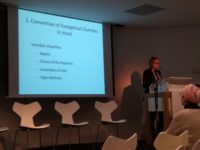It's been over a month since I flew to Amsterdam to attend the 10th Glopent conference. It was focused on “the future of Pentecostalism” as a global social phenomenon. Papers were usually attempting to describe highly diverse Pentecostal groups from different parts of the world. We've learned something about Nigerian Pentecostal ministries in Europe, Arab Pentecostals in Palestine, Pentecostals in India, Hillsong ministries in European context, etc. Jon Bialecki's keynote seemed to step out of this line, as he was discussing sociology of miracles and their meaning in Pentecostal communities, but even this was illustrated on John Wimber's Vineyard.
One particular food for thought that I'm swallowing up till now is the very aim of this conference. I couldn't be present on all the parallel sessions, but in all papers I've heard there, I noticed that the authors were almost totally excluding any reference to theological categories as means for comprehending sociological problems they were attempting to solve. There was so little said about theological background of the inquired Pentecostal phenomena that an uninformed visitor could easily assume that they have no bearing at all on what is being discussed. But they do! With all due respect to the authors, I do not think that one can understand Dr. Owuor without a reference to the content of his sermons, written publications and known theological training (even the informal). Arab Pentecostals in Palestine can not be understood without inquiry into their biblical theology of the Holy Land. Social position of the Pentecostal churches in India can not be explained without reference to Pentecostal theology of social equality. The same would apply to Nigerians in Europe and to pretty much everything that “the future of Pentecostalism” might bring.
As I was sitting and listening to these papers, I was often significantly baffled. It seemed to me that theological background of social phenomena are either so clear that these people don't even need to discuss them, or they can't see them because they are sociologists, not theologians.
My overall impression from the conference was, however, very good. I was happy to have some inspiring conversations. We also had a nice time with my colleague hanging around in Amsterdam. My critical note is open to your questioning and I will be happy to discuss it further. At this point I must insist that it is not adequate to describe religious social phenomena with no regard to their theological motivations.
- My son gave me this little snack so that I wouldn’t starve on my journey.
- This is definitely me and my colleague.
- In the Air BnB apartment.
- Theologians do not eat well.
- I saw the future of Pentecostalism at the bottom of this cup of wine.
- Denise Austine’s paper was very good.
- Palestinian activists.
- Heineken at the Amsterdam’s roof.
- This we spotted under a bridge. Ezekiel 3:18 states: “18 If I say to the wicked, “You shall surely die,” and you give them no warning, or speak to warn the wicked from their wicked way, in order to save their life, those wicked persons shall die for their iniquity; but their blood I will require at your hand.”












